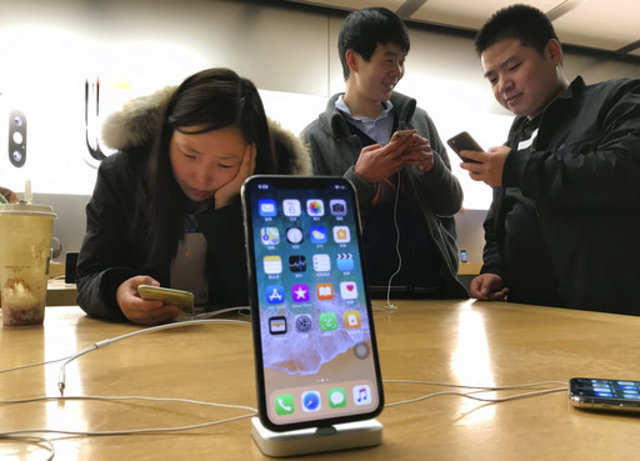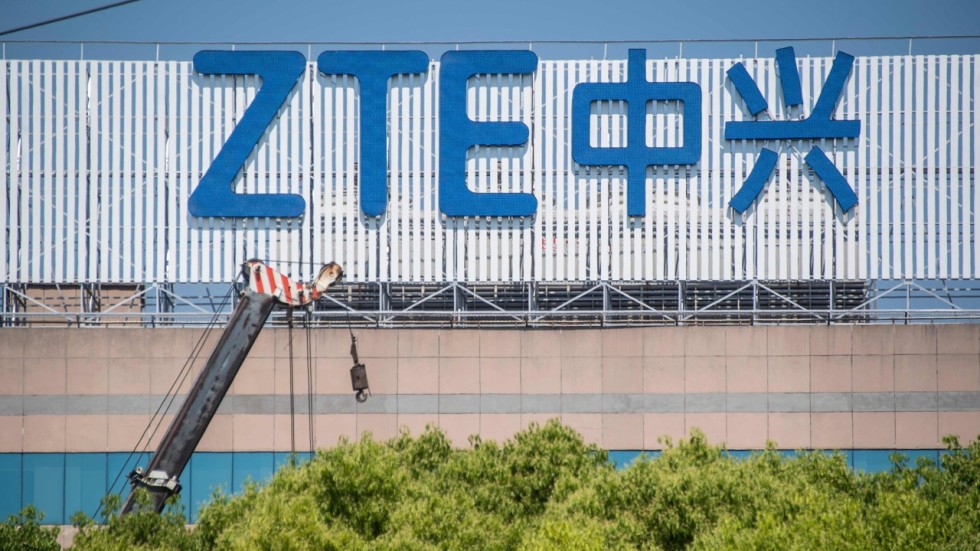A Chinese court has ordered a ban on the sale of several older Apple Inc iPhone models in China for violating two patents of chipmaker Qualcomm Inc, although Apple said all of its phone models remained on sale in the mainland.
The case, brought by Qualcomm, is part of a global patents dispute between the two U.S. companies that includes dozens of lawsuits. It creates uncertainty over Apple's business in one of its biggest markets at a time when its falling share prices reflect concerns over waning demand for new iPhones.

Apple said on Monday it had filed a request for reconsideration with the court, the first step in appealing the ban.
Qualcomm said the Fuzhou Intermediate People’s Court in China found Apple infringed two patents held by the chipmaker and ordered an immediate ban on sales of older iPhone models, from the 6S through the X.
Apple said all iPhone models remained on sale in China and the trio of new models released in September were not part of the case.
China, Hong Kong and Taiwan are Apple's third-largest market, accounting for about one-fifth of Apple's $265.6 billion in sales in its most recent fiscal year.
Qualcomm, the biggest supplier of chips for mobile phones, filed its case in China in late 2017, arguing that Apple infringed patents on features related to resizing photographs and managing apps on a touch screen.
Apple responded by saying that "Qualcomm’s effort to ban our products is another desperate move by a company whose illegal practices are under investigation by regulators around the world." Apple stores in China continued with business as usual Tuesday despite a court-ordered ban on iPhone sales, but the US tech giant faces a growing nationalist backlash over the US-sought arrest of a Huawei executive.
According to US chipmaker Qualcomm, which requested the ban, the Fuzhou Intermediate People's Court ordered four Apple subsidiaries to stop selling older models of the iPhone, including the iPhone 7, iPhone 7 Plus ₹ 47,324, iPhone 8 ₹ 54,999, and iPhone 8 Plus.
But Apple stores contacted by AFP in Beijing, Shanghai and Fuzhou said they were still selling those older models - confirming a company statement that all remain available.
Sales staff at a Beijing Apple store said they had not yet received any internal notices about the court injunction on iPhone sales.
"If the ban is ultimately imposed, there will be no Apple products under CNY 6,500 ($940 or about Rs. 67,700) in China," noted Wang Xi, a senior market analyst at research firm IDC.
That would give Chinese smartphone brands, such as Huawei, "more opportunities in the high-end market", he told AFP.
Qualcomm's request to halt iPhone sales is part of a long-running patent dispute with Apple.
Separately, Apple is also the target of nationalist sentiment over the arrest of Huawei's chief financial officer in Canada at the behest of the United States on alleged Iran sanctions violations.
The Chinese government has condemned the arrest and demanded her release.
The case, brought by Qualcomm, is part of a global patents dispute between the two U.S. companies that includes dozens of lawsuits. It creates uncertainty over Apple's business in one of its biggest markets at a time when its falling share prices reflect concerns over waning demand for new iPhones.

Apple said on Monday it had filed a request for reconsideration with the court, the first step in appealing the ban.
Qualcomm said the Fuzhou Intermediate People’s Court in China found Apple infringed two patents held by the chipmaker and ordered an immediate ban on sales of older iPhone models, from the 6S through the X.
Apple said all iPhone models remained on sale in China and the trio of new models released in September were not part of the case.

China, Hong Kong and Taiwan are Apple's third-largest market, accounting for about one-fifth of Apple's $265.6 billion in sales in its most recent fiscal year.
Qualcomm, the biggest supplier of chips for mobile phones, filed its case in China in late 2017, arguing that Apple infringed patents on features related to resizing photographs and managing apps on a touch screen.
Apple responded by saying that "Qualcomm’s effort to ban our products is another desperate move by a company whose illegal practices are under investigation by regulators around the world." Apple stores in China continued with business as usual Tuesday despite a court-ordered ban on iPhone sales, but the US tech giant faces a growing nationalist backlash over the US-sought arrest of a Huawei executive.
According to US chipmaker Qualcomm, which requested the ban, the Fuzhou Intermediate People's Court ordered four Apple subsidiaries to stop selling older models of the iPhone, including the iPhone 7, iPhone 7 Plus ₹ 47,324, iPhone 8 ₹ 54,999, and iPhone 8 Plus.
But Apple stores contacted by AFP in Beijing, Shanghai and Fuzhou said they were still selling those older models - confirming a company statement that all remain available.
Sales staff at a Beijing Apple store said they had not yet received any internal notices about the court injunction on iPhone sales.
"If the ban is ultimately imposed, there will be no Apple products under CNY 6,500 ($940 or about Rs. 67,700) in China," noted Wang Xi, a senior market analyst at research firm IDC.
That would give Chinese smartphone brands, such as Huawei, "more opportunities in the high-end market", he told AFP.

Qualcomm's request to halt iPhone sales is part of a long-running patent dispute with Apple.
Separately, Apple is also the target of nationalist sentiment over the arrest of Huawei's chief financial officer in Canada at the behest of the United States on alleged Iran sanctions violations.
The Chinese government has condemned the arrest and demanded her release.
0 Comments